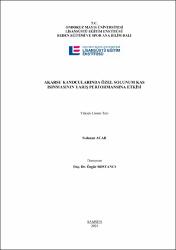Akarsu kanocularında özel solunum kas ısınmasının yarış performansına etkisi
Citation
Acar, S. (2021). Akarsu kanocularında özel solunum kas ısınmasının yarış performansına etkisi. (Yüksek lisans tezi). Ondokuz Mayıs Üniversitesi, Samsun.Abstract
Bu çalışmada solunum kas ısınmasının, Akarsu slalom sporcularında yarış performansına, solunum fonksiyonlarına ve aerobik kapasitelerine etkisinin incelenmesi amaçlanmıştır. Çalışmaya, Artvin/Yusufeli ilçesinde bulunan Türkiye Olimpiyatlara Hazırlık Merkezi ve Sporcu Eğitim Merkezinde yatılı olarak kalan toplam 15 erkek Akarsu slalom sporcusu (15,8±1,7 yıl) katılmıştır. Sporcuların solunum fonksiyon değerleri (FVC (L), FEV1 (L), FEV1/FVC (%) ve PEF (L/sn)) ve aerobik kapasiteleri (Yo-yo IRT 1) belirlendi. Sportif performans ölçümleri ise 300 m sprint parkuru ve 300 mʼlik 5ʼi ters olmak üzere 20 kapıdan oluşan Akarsu slalom yarış parkurunda sporcuların başlangıç ve bitiş çizgisi arasında geçirdiği süre kronometre ile kayıt altına alındı. Çalışma 6 aşamadan oluşup ölçümler toplam 4 gün sürmüştür. Deneklere ilk 3 aşama genel ısınma (GI) protokolü diğer 3 aşamada genel ısınma sonrası %40 MIP şiddetinde 30 nefeslik 2 setten oluşan solunum kası ısınması (SKI) protokolü uygulandı. Solunum kas ısınması POWER breathe® (IMT Technologies Ltd. Birmingham, UK) cihazı ile yapıldı. Değişkenlere ait normallik varsayımı ShapiroWilk testi ile varyansın homojenliği ise Mauchly’s Sphericity testi ile belirlendi. Araştırmaya dâhil edilen değişkenlere göre normal dağılım gösteren gruplarda Paired T test (p>0,05), normal dağılım göstermeyen gruplarda ise Wilcoxon testi kullanılmıştır (p<0,05). SKI öncesi ve sonrası, solunum fonksiyon parametrelerinde; anlamlı farlılıklar görülmedi (p˃0,05). SKI sonrası Yo-yo IRT 1 testinde katedilen mesafe %22,82, VO2mak değeri %3,28 oranında artmış ve sprint süresi %1,67, slalom yarış parkurundaki süresinde ise %1,15 oranında azalma meydana gelmiştir. Elde edilen verilere göre solunum kas ısınmasının, solunum fonksiyon parametrelerini etkilemediği, aerobik kapasiteyi artırdığı ve Akarsu slalom sporcularının yarış sürelerini olumlu etkilediği söylenebilir. The aim of this study was to examine the effect of Respiratory Muscle Warmup (RMW) on racing performance, respiratory function and aerobic capacities in Canoe slalom athletes. A total of 15 male athletes (15.8±1.7 years) who stayed as boarders at the Turkish Olympic Preparation Center and Athlete Training Center in Artvin/Yusufeli participated in the study. Spirometer was used to determine there spiratory functions of athletes ((FVC (L), FEV1 (L), FEV1/FVC (%) ve PEF (L/sn)) and Yo-yo Intermittent Endurance Test-1 was used to detect aerobic capacities (VO2max). In the sporty performance measurements, 300 m sprint track and 300 m canoe slalom racetracks (consisting of 20 gates, 5 of which are up-stream) were used. The experiment al design consisted of 6 stages and theme a surement stook 4 days. The subject sapplied the general warming (GWU) protocol in the first 3 stages, and the RMW protocol at 40% MIP in additionto the GWU in the other 3 stages. RMW was performed using POWER breathe® (IMT Technologies Ltd. Birmingham, UK). The assumption of normality of the variables was determined by the Shapiro-Wilk test. Mauchlyʼs Sphericity test was used to determine the homogeneity of variances. Paired T-test (p>0.05) was used in the groups that provided the normal assumption in the study, and the Wilcoxon test wasused in the groupsthat did not provide it (p<0.05). There was no significant difference in respiratory function before and after SKI (p˃0.05). The RMW protocol was found to improve distance (22.82%) (Yo-yo in IRT 1 test) and VO2max (3.28%). In addition, it was seen that RMW had an effect on the sprint time (1.67%) and the time on the slalom racetrack (1.15%). According to the finding so btained, it can be said that the RMW protocol does not improvet here spiratory function of athletes, but positively affects aerobic capacity and race time.
















